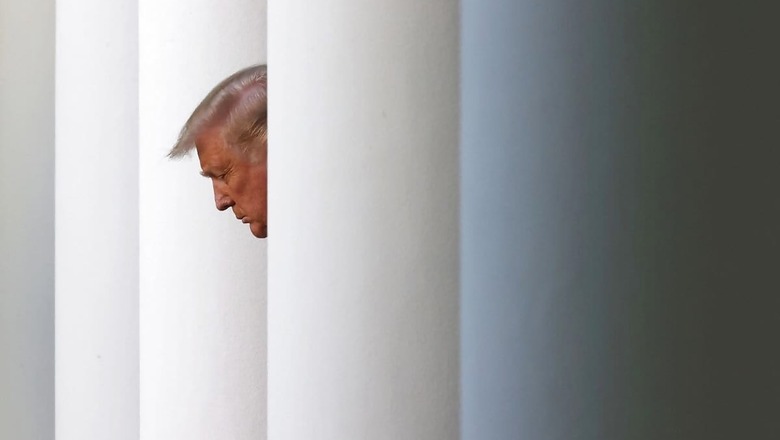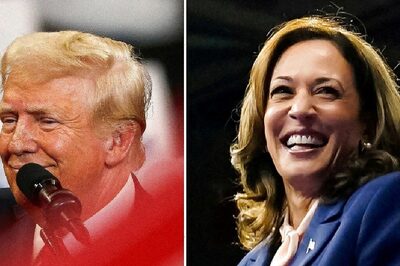
views
Incumbent US President Donald Trump is seeking a second term in the November 3 Presidential election. The 74-year-old New York-born Republican leader rode to victory on the promises of stricter immigration laws and boosting the economy under the slogan “Make America Great Again” in 2016. A businessman, Trump had never been elected to a government office before his present term as the President.
His presidency has been mired in scandals, controversies, the coronavirus pandemic and the nation-wide anti-racism protests, following the custodial death of a 46 year-old African American George Floyd. All of these have assumed towering importance in the contest between Trump and Democratic rival Joe Biden. With just days left to the crucial poll, here’s a look Trump’s approach to key issues facing the United States.
Signature issues
Immigration
Immigration, one of the central planks of Trump’s previous Presidential campaign, has perhaps been one of the most controversial. The incumbent President’s 2016 campaign hinged on the slogan “Build the Wall”, the construction of which on the US-Mexico border is underway. According to the BCC, the President has secured funding for 445 miles of the 722-mile-long wall, which he had promised would be paid for by Mexico.
As part of his hardline stance on immigrants, Trump banned the arrival of visitors from seven Muslim-majority countries such as Iran, Iraq, Syria, Yemen, Somalia, Sudan and Libya to the US, which was executed in partly after a legal battle. Moreover, the Trump administration made granting of asylum harder for migrants and enforced a “zero-tolerance” policy that led to the separation of thousands of families at the border the US shares with Mexico.
The President also proposed a system of migration to the US based on merit instead of family ties. As the Covid-19 pandemic prompted severe job losses among Americans, the US also suspended the H-1B visa, highly sought after among Indian IT professionals aspiring to work in the US.
Healthcare
Trump has aggressively prioritized repealing the Obama-era Affordable Care Act, also called Obamacare, which is yet to come to fruition.
The administration has, however, succeeded in rolling back significant portions of the Act including the individual mandate, under which people were required to pay a tax penalty if they failed to buy health insurance.
Obamacare was sought to be replaced by another healthcare system, which would still include provisions for protection under the former for those with pre-existing conditions. The Trump dispensation also curbed subsidies to those in low-income groups, while also reducing payments to insurance companies helping the sick.
In time of a global health emergency, Medicaid, a healthcare scheme for low-income earners in the US, has also taken a hit. States were given permission by the Trump administration to place work requirements on those seeking Medicaid, thereby essentially cutting spending on the programme.
Appointment of judges
Appointment of conservative judges, especially in the Supreme Court, is another contentious promise fulfilled by Trump during his first term. Neil Gorsuch, Brett Cavanaugh, and now the hurriedly instated Amy Coney Barrett – all appointed by Trump – now stand poised to shift the scales of the top court by 6:3 in favour of the conservatives. The decision, taken weeks before the Presidential election, could hinder rulings in LGBTQ+ and abortion rights cases.
Foreign Policy
Trump’s foreign policy decisions over the course of his first term have ruffled quite a few feathers. “America First” has been the cornerstone in the Trump dispensation’s foreign policy decisions, which is based on the belief that the US must prioritise its economic interests, placing its obligations as a global leader on the back burner. This has led to a series of withdrawals by the US government on several key international alliances and deals, including the Iran nuclear deal and the Paris Agreement.
Trade
Trump views the signing of two major trade deals — an updated pact with Mexico and Canada and the first phase of a China agreement — as signature achievements. China is obligated to buy agricultural, energy and other produce worth over $200 billion from the US over two years in return for reduced tariffs on Chinese imports in US.
Iran nuclear deal
In 2018, Trump pulled out of the Joint Comprehensive Plan of Action (JCPOA) – a deal that allowed Iran to carry out its nuclear programme in exchange for lesser sanctions. The withdrawal, followed by Trump’s subsequent decision taken to strengthen deployment of troops in the region to check Iran’s influence, and eventually the killing of Iranian Revolutionary Guard chief Qassem Soleimani, flared up tensions between the two adversarial nations.
Israel & Palestine
Under Trump, the US has attempted to broker peace between Israel and Palestine, however, making controversial decisions. He moved the US embassy in Israel from Tel Aviv to Jerusalem in 2018. Moreover, Trump has often stated that he wishes to stop “endless wars” involving American troops overseas, a desire evident in his decision to withdraw troops from Afghanistan. The US President has also considered quitting NATO, The North Atlantic Treaty Organization, whilst demanding that other members of the alliance increase spending on defence.
North Korea
Summits with Kim Jong-un for denuclearisation of North Korea were of significance among Trump’s foreign policy moves during his first term. The two summits, held in Singapore and Vietnam, failed as the two nations could not arrive at a deal.
Paris Agreement
In 2017, the US withdrew from the Paris Agreement in what Trump said was in line with his “America First” policy. The accord, signed in 2015, calls upon nations to take steps towards climate action, specifically to lower greenhouse gas emissions in order to keep the global average temperature well below 2 degrees Celsius above pre-industrial levels. Trump had argued that the Paris Accord was unfair to the US, and would be disadvantageous to its economy.
Mueller report and impeachment
Congressional Democrats unsuccessfully tried to remove Trump from office over his invitation of foreign interference in an American election. Last year he had asked Ukraine, a vulnerable US ally facing Russian aggression, to pursue an investigation into Democratic nominee Joe Biden and his son Hunter Biden into unsubstantiated corruption allegations.
He almost went on to become the third US President to be impeached when the Democratic-led House of Representatives voted to charge him with abuse of power and obstruction of Congress over the Ukraine matter. The Republican-led Senate, however, kept him in office by acquitting him at a trial in February.
The President bristled at investigations into Russia’s role in the 2016 election. A special counsel appointed by the Justice Department, Robert Mueller, documented Russian election interference to sow discord in the United States, disparage his opponent, Hillary Clinton, in the previous election, and help Trump become the President. Mueller detailed numerous contacts between Trump campaign figures and Russians.
Trump called the investigation a “witch hunt” and declared “complete and total exoneration” in 2019 after Mueller’s report did not accuse him or his campaign of a criminal conspiracy with Russia. Mueller, however, did not exonerate Trump of committing obstruction of justice in trying to impede the investigation, but Attorney General William Barr, a Trump appointee, subsequently cleared him.
Trump avoided condemning Moscow, publicly giving credence to Putin’s denials of election interference while doubting US intelligence conclusions. He also praised Putin for his strength, part of a pattern of complimenting authoritarian leaders including North Korea’s Kim Jong Un and Rodrigo Duterte of the Philippines.
Coronavirus pandemic
In the face of the upcoming election, the incumbent Republican President has time and again downplayed the gravity of the Covid-19 pandemic, despite having contracted the infection himself. Days before the election, with the US logging a record 94,000 cases, Trump said at an election rally in Detroit that the virus will “disappear”.
The Trump administration’s handling of the pandemic has, naturally, dominated the upcoming election, with rival Joe Biden pitting it at the centre of his own campaign. According to a poll held by Reuters/Ipsos in October, when Trump had caught the virus, 37% of American adults approved of his handling of the pandemic and 59% disapproved.
The Trump administration is accused of delaying its response to the medical emergency, despite having been warned of a potential onslaught of Covid-19 cases. Experts were countered, most notably top US epidemiologist Dr. Anthony Fauci, on several issues such as the efficacy of hydroxychloroquine, use of face masks and the severity of the virus.
Trump has time and again blamed China for the pandemic, stating also in his UN General Assembly address that the world body hold accountable “the nation which unleashed this plague onto the world.” On one occasion, the President also labelled the novel coronavirus as “China virus”, a comment loaded with racist undertones.
Racism and Black Lives Matter
Anti-racism protests and police brutality spread to many cities across the United States, sometimes accompanied by violence and looting, followed by the custodial death of George Floyd, an African American in Minneapolis. Trump called demonstrators “thugs,” and after a summer of nationwide unrest that led to millions marching in the streets of America, billed himself as a leader who will restore “law and order” — an attempt to appeal to white grievances and allay white suburban fears.
In 2017, he blamed “both sides” for violence between white supremacists and anti-racism protesters in Charlottesville, Virginia, and wondered why the US was admitting so many immigrants from “shithole countries” like African nations. He said four Democratic congresswomen of color should go back to the “broken and crime infested” countries they came from, ignoring the fact that all of them are American citizens and three were born in the US.
Despite this, Trump has tried to woo black voters during his 2020 election campaign. In Atlanta, he announced a “Platinum Plan” laying out his “promise to Black America” if he wins, including a push for economic development and loan money and a pledge to designate Juneteenth as a federal holiday.
(With inputs from Reuters and Associated Press)
Read all the Latest News and Breaking News here




















Comments
0 comment